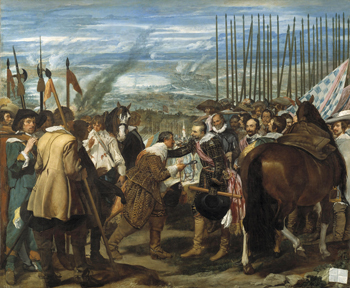| Search Art Prints | ||||||||||||||||||||
| Search Artists | ||||||||||||||||||||

|
||||||||||||||||||||
|
|
|||||||||||||||||||

The Surrender of Breda

|
The Surrender of Breda
Diego Velázquez painted ‘The Surrender of Breda’, or “El cuadro de las lanzas” as it is known in Spanish, in the year 1635. This painting is a unique visual of the historic moment when Spanish general, Ambrosio Spínola, received the keys to the city of Breda from Dutch governor, Justin of Nassau, ending a long war to prevent Dutch independence.
In military-themed art works, we are often shown the typical emotions associated with a victorious ending, i.e. joy and celebration. In ‘The Surrender of Breda’, however, Velázquez chose to create a subdued sentiment - relief. The prominent figures appear relieved by the finality of the war and an aura of peace and quietude dominates the painting. Also, in works of this nature, we usually see the victor raised high on a horse while the fallen general is positioned at the feet of the conqueror. Uncharacteristically, this particular piece has the winners and the losers on the same level, showing a refined respect for both sides.
Velázquez brings emphasis to the foreground by ensuring that the painting’s focus is placed on the important activity occurring amongst the figures. Evidence of a post-battle scene is cleverly brought about by the smoke billowing in the background.
‘The Surrender of Breda’ is widely considered one of Diego Velázquez’s finest works, displaying his unmatched talent in creating atmosphere, portraiture, effectual light/dark contrasts, as well as a masterful ability in utilizing perspective techniques, including aerial viewpoints. Jan Morris has referred to this painting as “one of the most Spanish of all pictures”. - Wikipedia
About the Artist
Diego Rodriguez de Silva y Velázquez began his studies in painting at a very early age. In 1611, at the age of only twelve years old, he enrolled on a five or six year apprenticeship with painter Francisco Pacheco. While under Pacheco’s guidance, Velázquez learned numerous techniques and perspectives.
By 1624, after marrying the daughter of his teacher and acquiring a notable reputation in Seville, Velázquez moved to Madrid. He painted King Philip V’s portrait in a single day, and so pleased was the king that he offered Diego the position of court painter after his number one painter died.
Diego Velázquez ventured twice to Italy, the first time in 1629, and again in 1649. Both trips would prove to be an integral part of his artistic career; he further developed his techniques while exploring paintings from various famous artists.
‘The Surrender of Breda’ is currently located at Museo del Prado, in Madrid, Spain.











